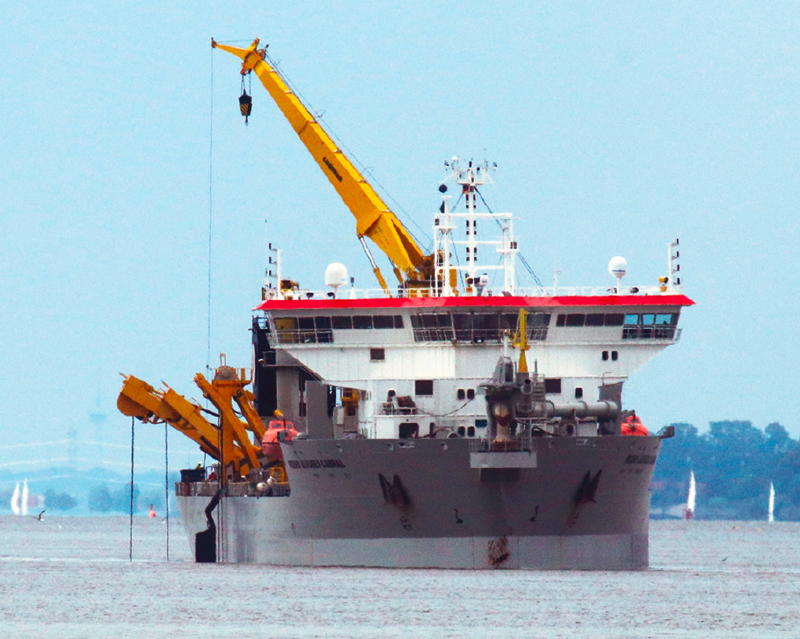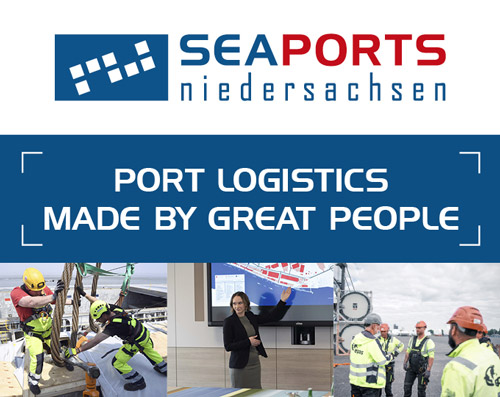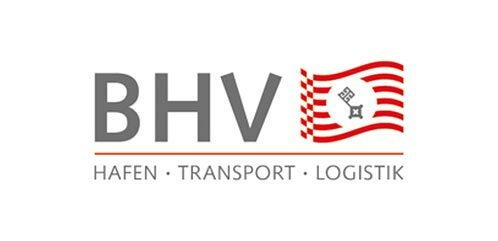No discussion about Germany’s maritime sector would be complete today without the terms “national port strategy” and “port cooperation” cropping up at some stage. However, those responsible for ports in each German state and the stakeholders have very different views on how things are developing. They do agree, though, that Berlin has a decisive influence on both the direction we will need to row in the future and how quickly. Moreover, each location wants to emphasise its individual qualities as a universal port.
He cites the deep-water container port JadeWeserPort, a joint project between the German states of Lower Saxony and Bremen, as an example of how port cooperation can work in Germany. He also refers to the port development catalogue, which since 2012 has become established as a coordination platform for northern German port policy, and to the ports’ shared international trade fair activities, which take place via the “German Ports” communication and marketing platform. At the same time, he clarified: “more intensive north German port cooperation doesn’t imply the state should be responsible for cargo management and can’t be the sole answer.”
In his view, the seaports of Lower Saxony can bring a range of skills and strengths to the cooperation process. “Each port has different focal points,” the minister emphasised. In Wilhelmshaven, for example, the focus is on container shipping and energy, while in Stade much revolves around LNG and chemical products. Alongside this, Cuxhaven is at the forefront of offshore wind energy, while Brake focuses on agricultural products and Emden on vehicles, cellulose and wood products. “All in all, Lower Saxony’s seaports already constitute a major German universal port,” Lies concluded.

“After all, we’re in the same boat.”
Olaf Lies, Minister for Economic Affairs, Transport, Construction and Digitalisation of Lower Saxony
Germany’s only deep-water container port, the JadeWeserPort, is cited by many as a prime example of successful cooperation, owing to the financial participation of the states of Bremen and Lower Saxony.
Bremen’s long wish list
For Dr Claudia Schilling, Bremen’s Senator for Science and Ports, the desired port cooperation is an important adjustment that should be made without delay. “In order to remain competitive internationally,” she said, “the ports must cooperate more closely and offer innovative and sustainable solutions.” She also does not believe politicians are solely responsible. “Politicians must set the framework for stronger cooperation between the ports and anchor the importance of this issue in the minds of everyone involved,” she added. “At the same time, stronger cooperation demands the support of each and every individual player in this field, which of course includes the port industry and others, such as the chambers of industry and commerce.”
Schilling believes that the Ports of Bremen, Germany’s smallest state, which already boasts a broad range of cargo from containers and cars to bulk goods and project cargo and is currently working intensively to make its ports fit for the future, can become one of Europe’s most significant universal ports.
“We’re renewing 2.6 kilometres of the container quay so the large container ships can continue to be handled competitively,” she explained. This is a significant component of Bremish Ports’ policy. “The importance of the ports for the economic future of the country has never been greater,” she added with a view to both the current global situation and the Maritime Conference taking place in Bremen in mid-September. “I hope the German government will take more account of this development in future and support the ports fairly, based on their importance. So far, support for all German ports has been 38 million euros per year. I’d like to see another zero added to this sum.”
Hamburg sees “efficiency gains” as its mainspring
A few kilometres to the north-east, Dr Melanie Leonhard, Hamburg’s Senator for Economic Affairs and Innovation, is positive about the joint development steps taken. “Hamburg emphatically welcomes the process of drawing up a National Ports Strategy and is actively involved in its development,” she stated. “We see a fantastic opportunity to reposition national port policy for a successful future.” In this context, she has observed active cooperation on numerous levels and particularly cites joint digitis-ation projects as examples of this. “In most cases, there’s already cooperation in areas where there are immediate efficiency gains to be made,” Leonhard continued. “Yet, it will also be important for the coming years to describe in concrete terms the role of the ports for foreign trade, and for Germany as a whole, in a national port strategy. This will give a clearer nationwide approach that can lead to additional cooperation.” With this in mind, she also emphasises the advantages that her location can contribute. “Hamburg is the most important German seaport,” she added. “As a universal port with outstanding hinterland connections, it simultaneously combines logistical advantages with being an industrial and manufacturing location.”

“The importance of the ports for the economic future of the country has never been greater.”
Dr Claudia Schilling, Bremen’s Senator for Science and Ports

“We see a fantastic opportunity to reposition national port policy for a successful future.”
Dr Melanie Leonhard, Hamburg’s Senator for Economic Affairs and Innovation
“Competition in a very small area makes little sense”
It is in the nature of things that people who are firmly anchored in day-to-day business often have a somewhat different perspective on an issue. For Christoph Holtkemper, board member of Bremischen Hafen- und Logistikvertretung (BHV), cooperation is only one possible answer to better survive in competition. He indicates that, although the ports on the Elbe and Weser have always been characterised by a strong competitive spirit, shipping agents from Asia, for example, often regard the German coast as a cohesive economic region.
“Consequently, competition in a very small area, especially in container handling, makes little sense,” he said. Moreover, the idea of cooperation has already been practised for years by medium-sized companies in Bremen and Bremerhaven and has been established successfully in other ports too. “I speak here for the BHV member companies, in particular, that not only provide their logistics services right on our doorstep, but that have also successfully gained a foothold in other ports, thanks to their expertise,” added Holtkemper. He also sees JadeWeserPort as another example of successful cooperation. “This is the only German port capable of handling fully unloaded large container ships, which is not possible at the terminals on the Elbe and Weser. It therefore has a central role within the framework of cooperation between ports in northern Germany,” he emphasised. “Our government must take over the neutral cooperation and provide significantly more money for the infrastructure of the German ports,” added Holtkemper regarding the role he feels politicians should play.
No intervention in market-based mechanisms
For Eduard Dubbers-Albrecht, President of the Bremen Chamber of Commerce, an essential prerequisite for successful cooperation between northern German seaports is that a common will exists, even beyond party and state borders. “As far as the Bremen Chamber of Commerce is concerned, only entrepreneurial decisions should pave the way for such a cooperation,” he stated, commenting on the possible merger of the two major container terminal operators, Eurogate and HHLA, which is currently officially on hold due to the war in Ukraine and ongoing logistics problems. “Direct political influence would mean interfering with market-based mechanisms.” Alongside this, he also believes that Berlin should contribute more financially to the port costs. “German seaports are in our country’s interest in terms of foreign trade and energy policy, meaning they are of national importance,” he continued. “This is already the case in Germany, even if there is certainly still room for improvement,” he added, now commenting on the current state of port cooperation in Germany. He feels that if Germany’s coastal states were to establish a common coordination agency for the affairs of northern German seaports, this could boost development in this process. (bre)

“The JadeWeserPort has a central role.”
Christoph Holtkemper, BHV board member(BHV)

“There is certainly still room for improvement.”
Eduard Dubbers-Albrecht, President of the Bremen Chamber of Commerce
In the spirit of a northern German port strategy
In December 2022, the state and senate chancelleries, the ministers for Economic Affairs and the Environment from Hamburg, Schleswig-Holstein and Lower Saxony, and the German government agreed on a joint approach to sediment management. It was determined that, alongside the existing transfer sites, an increased amount of sediment should initially be transferred to the North Sea (Tonne E3). This measure will be implemented until such times as Schleswig-Holstein can issue a follow-up permit beginning in mid-2023, a solution that is initially intended to replace shipment in the Outer Elbe area. “It’s important that we have made Lower Saxony’s position clear,” said Lower Saxony’s Minister of Economic Affairs Olaf Lies in December 2022. “We don’t want to and must not make Hamburg’s sediment problems ours. However, the Port of Hamburg is extremely important for Lower Saxony in terms of the northern German port strategy, which is why our central concern is to follow a sustainable and mutually beneficial path.” In conversation with LOGISTICS PILOT recently, Lies further confirmed that the agreement on sediment management in the tidal Elbe was an important step. “It underlines the fact that the states affected – Hamburg, Schleswig-Holstein and Lower Saxony – wish to work out a viable, long-term silt solution in the Elbe, alongside the German government. We’ve already held a workshop on this subject.” (bre)






